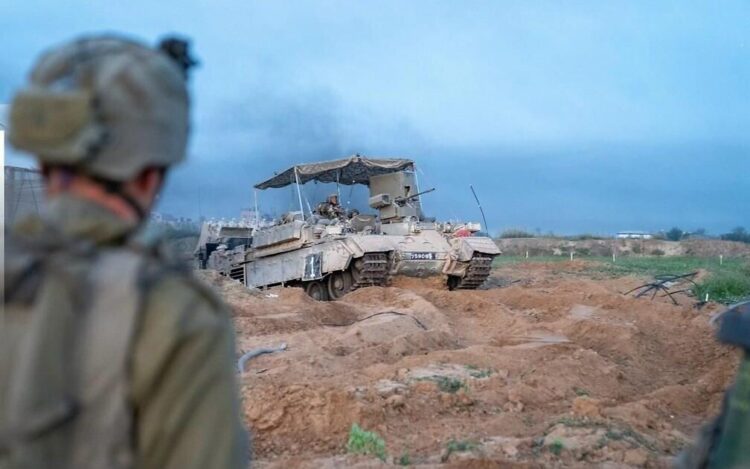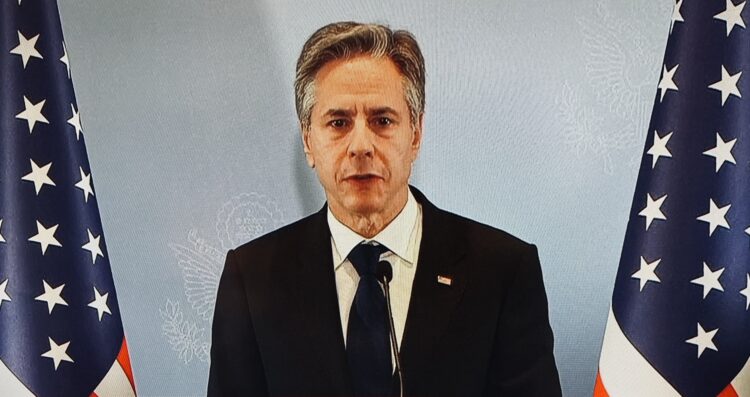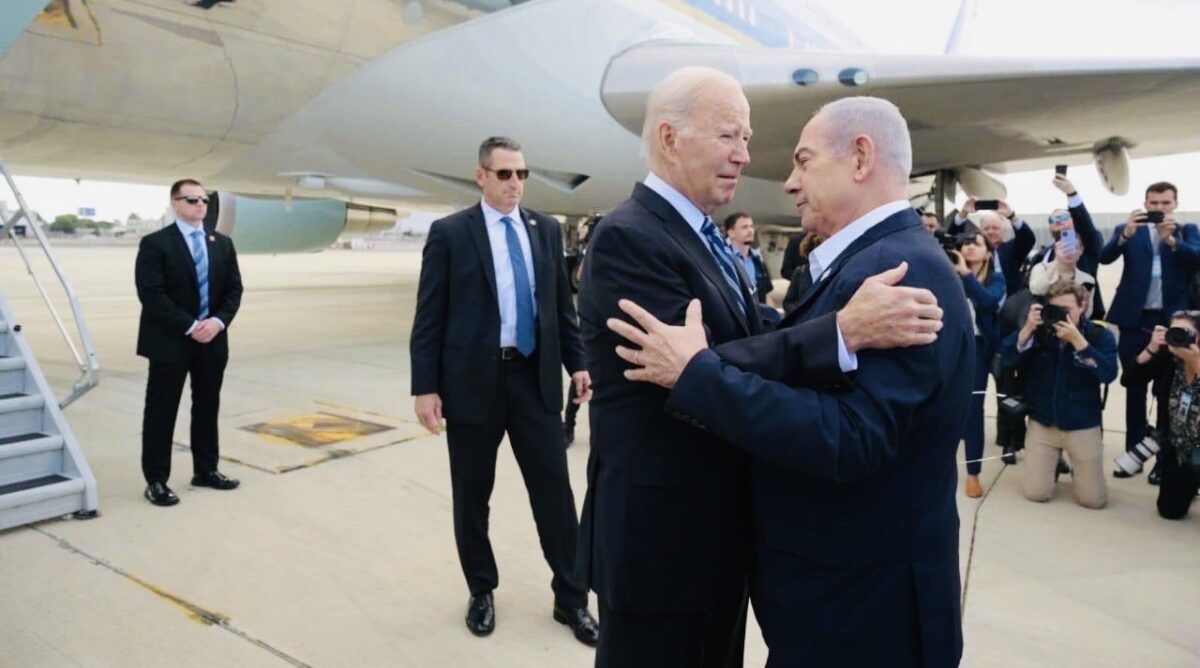To Israel’s detriment, global public opinion is shifting toward the Palestinians, nearly one month after Hamas ignited the fifth and most destructive border war in the Gaza Strip.
Israel garnered a great deal of international sympathy in the wake of Hamas’ brutal attack on October 7, which claimed the lives of 1,400 Israelis and foreigners in southern Israel. It was the worst single massacre of Jews since the Holocaust and the greatest intelligence and military failure since Israeli statehood 75 years ago.
But as Israeli forces drive deeper into the Gaza Strip and engage Hamas in ferocious combat, and as the Palestinian civilian death toll rises dramatically, the pressure on Israel to accede to “humanitarian pauses” and an immediate ceasefire grows incrementally.

Israeli political and military leaders are in unanimous agreement that Israel’s ongoing campaign in Gaza could take many months to finish, and that a ceasefire is off the table. But critics, such as secretary-general of the United Nations and the pope, want the fighting to end now, before Israel can achieve its war aims and alter the conditions that led to Hamas’ unprecedented assault.
This change in atmospherics is significant. The “poor Jews” narrative has been largely supplanted by the “poor Palestinians” story line.
Even U.S. President Joe Biden, who has supported Israel with words and deeds since that horrific day almost a month ago, has tacitly joined the chorus of critics. Biden has been influenced by the progressive wing and ultra-liberals in the Democratic Party.
Rashida Tlaib, the sole Palestinian American in the U.S. Congress, has accused Biden of turning a blind eye to “genocide” and has warned him that Arab Americans will abandon the Democratic Party.
Last week, 15 progressive Democrats refused to vote for a bipartisan resolution in the House of Representatives condemning Hamas and supporting of Israel. Instead, they called for a ceasefire, which the Biden administration continues to reject due to its belief that a truce would only benefit Hamas, leaving it in control of Gaza and free to terrorize Israelis in the future.

Dick Durbin, a U.S. senator from Illinois, came out in support of a ceasefire on November 2, adding the caveat that it would have to include the release of all hostages. He was the first senator to adopt this position. On November 3, he and a dozen other Democratic senators signed a statement endorsing “a short-term cessation of hostilities” rather than a full ceasefire, which is advocated by progressives and pro-Palestinian activists.
Durbin made his announcement a day after Ghazi Hamad, a senior Hamas leader based in Beirut, vowed that Hamas would undertake more terrorist attacks of the kind it perpetrated on October 7. “We are not ashamed to say this,” he declared, saying that Israel has to be wiped out.
Keenly aware of Hamas’ intentions, but cognizant that Israel’s invasion has alienated some Democrats, both in Congress and among American voters, Biden has gradually shifted to a dual policy.
He has repeatedly said that Israel has a “right,” a “duty” and a “responsibility” to defend itself. And he has supported Israel’s campaign to destroy Hamas’ military infrastructure, eliminate its political leadership and oust it from power.
By the same token, he has urged Israel to exercise restraint and minimize Palestinian civilian casualties, having conveyed his concerns in private and public.
Some would describe his approach as doublespeak, a retreat from his full-throated support of Israel.
Since his trip to Israel last month, Biden and his associates have offered Israel the following advice, which can be construed as subtle pressure.
First, he advised Israel to postpone a ground invasion to buy time for hostage negotiations, to funnel more humanitarian aid — food water, fuel and medical supplies — to Gaza, to address the crisis there, and to allow foreign nationals to leave the war zone.
Second, he and State Department officials suggested that Israel needs to ask itself “hard questions” regarding its end game in Gaza.
Third, the Biden administration claimed that Israel was not really militarily ready for the rigorous challenge of urban warfare in Gaza, a highly congested coastal enclave with a population of 2.2 million.
Fourth, U.S. officials argued that U.S. troops in Syria, Iraq and the Mediterranean basin required additional time to better prepare for expected attacks from pro-Iranian militias that back Hamas.
Yesterday, U.S. Secretary of State Antony Blinken visited Israel for the third time since October to convey this multifaceted message.

He landed in Israel shortly after General Herzi Halevi, the chief of the Israeli armed forces, disclosed that Gaza City, Hamas’ headquarters, was being encircled, and a week after Jacob Lew — the former secretary of the treasury in President Barack Obama’s cabinet — was confirmed as the United States’ next ambassador to Israel.

After conferring with Israel’s leadership in Tel Aviv, Blinken appeared at a press conference. He was visibly moved by the graphic atrocity photographs and video footage of murdered and mutilated Israelis he had just seen. He condemned Hamas yet again. And he expressed “solidarity” with Israel and reiterated that Israel had a duty and a right to defend itself.
Diverging from this unambiguous pro-Israel stance, he said that Palestinian civilians needed to be protected and that, in its quest to crush Hamas, Israel was obliged by the laws of war to limit civilian casualties and to take “tangible steps” to increase the flow of humanitarian aid into Gaza.
Israel has allowed more than 300 trucks from Egypt carrying food and medicine into Gaza, but aid workers say that a lot more is urgently needed.
Speaking of a political horizon for the Palestinians, Blinken touched on the need for a two-state solution after the dust finally settles.

Prime Minister Benjamin Netanyahu rebuffed Blinken, telling him that Israel would not consider even a temporary halt to its offensive unless the 240 or so hostages are released. And he rejected his request that fuel, the lifeblood of Hamas’ war machine, should be allowed into Gaza.
“We won’t stop until victory,” Netanyahu added, defining Israel’s objectives as the destruction of Hamas, the release of the hostages, and the “restoration of security for our citizens and children.”
This is a very tall order for Israel, but after the catastrophic events of October 7, the Israeli government is determined to see it through, notwithstanding objections from the United States or any other country.

Israel’s president, Isaac Herzog, addressed this issue in an impassioned op-ed piece in The New York Times on November 3. As he wrote, “Anyone who thinks the cynical exploitation of civilian suffering will tie our hands and save Hamas this time is wrong. For us and for the Palestinians, the suffering will end only with the removal of Hamas. Anyone trying to tie our hands is, intentionally or not, undermining not only Israel’s defence but also any hope for a world where these atrocities cannot happen.”
Herzog should be taken seriously. Israel, having been devastated by last month’s surprise attack, will not relent until Hamas has been obliterated.
